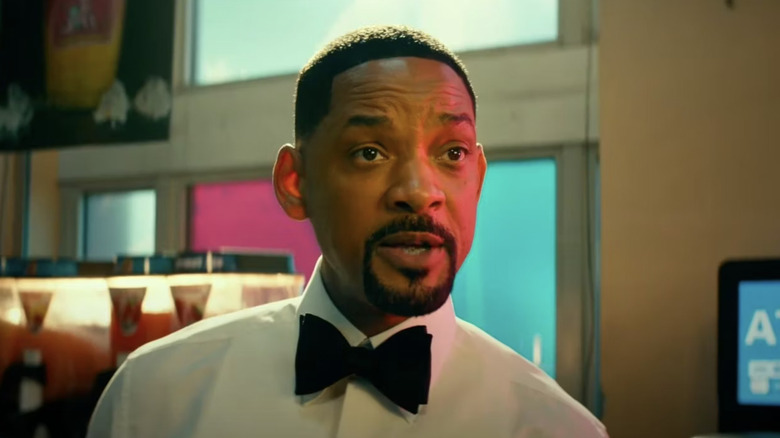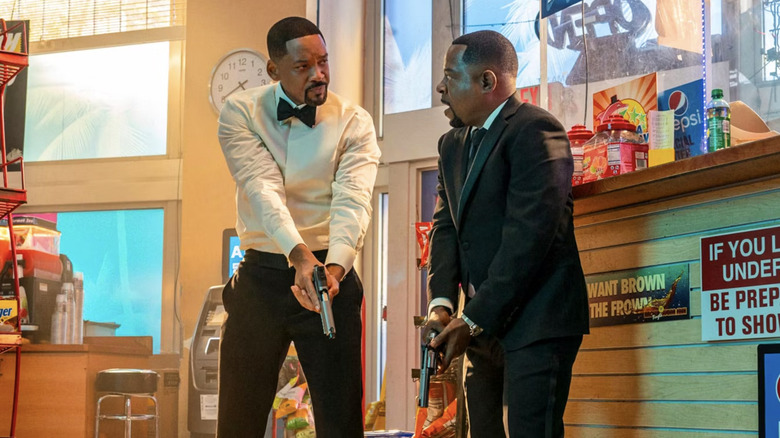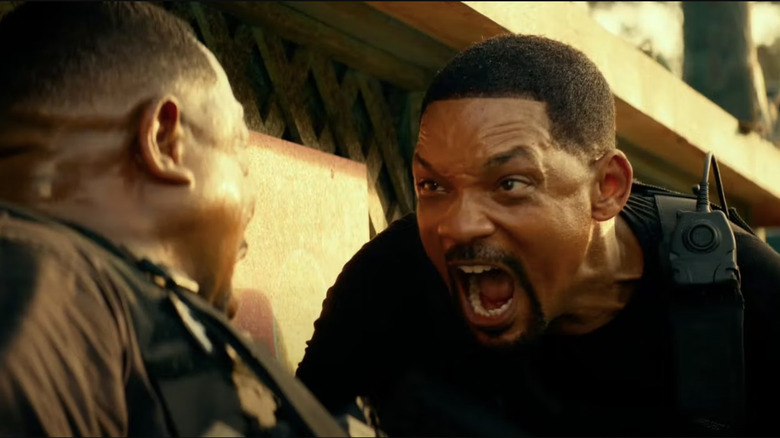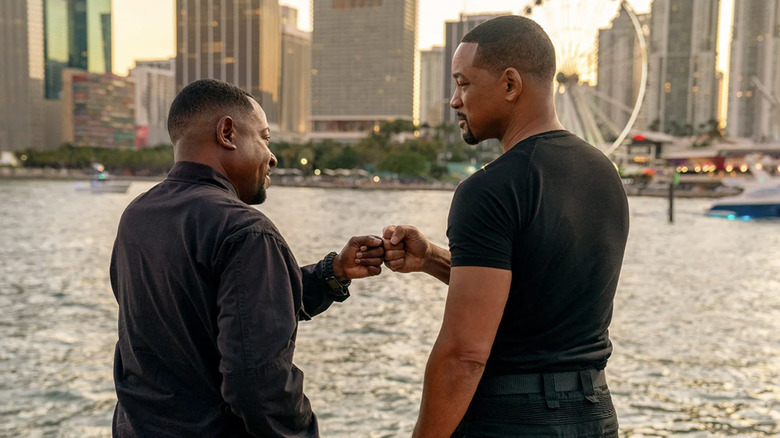Yes, Bad Boys: Ride Or Die Addresses The Will Smith-Shaped Elephant In The Room
This article contains mild spoilers for "Bad Boys: Ride or Die."
The concept of a movie star is a very fragile thing in 2024. Once upon a time, a movie star was something carefully cultivated, their public persona not just controlled but essentially constructed by a studio's PR department. Nowadays, movie stars are still highly desirable to producers and advertisers; the notion of a "name" actor still carries weight. Yet up-and-coming actors are struggling harder than ever to become so-called household names, as one of the biggest issues with media these days is that there's just too damn much of it.
Thus, we have a dearth of capital-M, capital-S Movie Stars right now, and the ones who can still open a movie on the strength of nothing but their name and persona make up a short list. On that list is Will Smith, who successfully transitioned from television to movie screens and became a beloved leading man. It's incorrect to label Smith's public persona as squeaky clean; unlike, say, certain comics who refused to work "blue." as Smith never shied away from racy or potentially offensive material in his work. That said, his films and especially his music career were never deliberately confrontational or off-putting, either, making Smith someone who could appeal to a wide range of people.
Sadly, that untouchable appeal shattered thanks to the unfortunate events of the 94th Academy Awards ceremony in 2022 when Smith unforgettably slapped comedian Chris Rock on camera and on stage over Rock's offensive joke at the expense of Smith's wife, Jada Pinkett Smith. Two years later, Smith's latest film, "Bad Boys: Ride or Die," both obliquely and intentionally addresses that elephant in the room, something it likely couldn't avoid — and perhaps it shouldn't.
The slap incident puts Ride or Die in a tough situation
"The Oscars Slap" became a sensation in the media as it was like a mass shared witnessing of a private moment. It also existed at a weird intersection of being unequivocally bad behavior while being somehow trite; while the slap was something that would've meant certain death for a star's career back in the day, it feels undeniably less abhorrent in a post-Harvey Weinstein, post-Kevin Spacey world.
Yet there's no denying the importance and power of witnessing something like that happen in real-time with your own eyes, which so many of us did. The incident didn't just happen to Smith, Rock, and the attendees of the Oscars ceremony; it happened to us, too. That makes such a moment harder to forget, and for some, harder to forgive. Adding surreal insult to injury was the fact that, later in the ceremony, Smith went on to win the Best Actor Oscar for "King Richard," giving an acceptance speech that naturally referenced his behavior earlier that night yet remained uncomfortably celebratory.
As the debate and controversy raged around Smith and the incident, it seemed that Smith and his team decided to simply wait it out and let the conversation die down, rather than try any attempts at damage control. That, plus the official 10-year ban from Smith attending the Oscars again, must've felt like enough at the time. Now, because Smith's first project following the incident, the Antoine Fuqua-helmed "Emancipation," received a typically muted release via Apple TV+, "Bad Boys: Ride or Die" finds itself in the unenviable position of trying to reconfigure (if not reconstitute) Smith's stardom in the public eye.
How Bad Boys: Ride or Die references the slap
It's up for debate which aspects of "Ride or Die" intentionally seek to reference the Oscars incident and/or perform damage control on Smith's image, as one could make the case that no element of the film was conceived for such purposes, and any resemblance is incidental (save for one but more on that in a moment).
Some may see the softening of Smith's character, Detective Mike Lowery, as a response to Smith's personal problems. At the start of the film, Mike is getting married to a brand new, previously unseen character, a medical doctor named Christine (Melanie Liburd), who apparently has swayed Mike from his previous playboy ways. Once the film's villain begins sending an entire cadre of assassins after Mike and his partner, Marcus (Martin Lawrence), Mike is shown to start suffering from panic attacks, making him vulnerable where he used to be totally flashy and steely. Yet these character developments seem less like a calculated response to Smith's real life and more a natural progression of Mike's character, as well as continuing the themes of aging and responsibility that the movie as a whole seeks to explore.
What is clear is that there is one scene that references the slap incident intentionally. During the film's climactic action sequence, Mike is having another debilitating panic attack, leaving Marcus to literally and figuratively slap some sense into him. The scene effectively gives Smith a taste of his own medicine and then some, subtextually punishing the actor while providing some slapstick humor for the characters. The moment has additional subtext for us, and how we the audience wish to view Smith; we don't want to be thinking about the man who stopped the Oscars cold for some weird beef, we want our action hero Mike Lowery to come back and take care of business.
Bad Boys: Ride or Die handles the issue cleverly
What's impressive about the reference to the slap incident in "Bad Boys" is how it takes what seems like a thorny situation and makes it work to the film's advantage. Rather than using the real-life controversy for a tasteless improv comedy riff, Smith, Lawrence, writers Chris Bremner and Will Beall, and directors Adil & Bilall use the moment as an emotional turning point. Their thesis, essentially, is that Smith was first introduced to cinema audiences as a literal and figurative Bad Boy, and if we want him back on our movie screens kicking ass and taking names, we have to accept the good with the bad.
I'm not saying the moment acts as absolution for Smith in real life, nor does it function as an "all is now forgiven" sweeping under the rug. It simply allows you, the audience member, to enjoy this movie and Mike Lowery more easily. Your own feelings on Smith, the incident, and what he does with his personal life from here remain yours.
As for Smith's acting career, the performance of "Ride or Die" will certainly make for a good indication of where he stands, though it should be said that given this year's weirdly tepid movie theater attendance track record, such numbers may not tell the whole story. While there will surely be those who see Smith returning to the franchise that helped launch his movie stardom as an act of desperation, there are others who, like myself, see it as Smith's acknowledgment of what put him on that pedestal in the first place. He's surely apologized to those directly involved in the incident; the delightful "Bad Boys: Ride or Die" is, in effect, his apology to us.
"Bad Boys: Ride or Die" is in theaters now.



